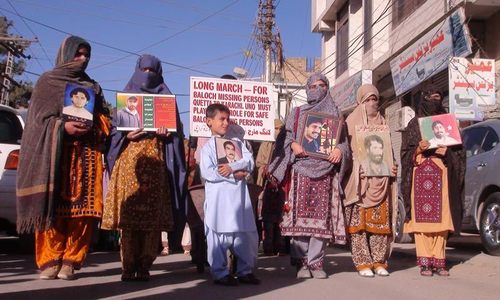
ISLAMABAD: Justice Ejaz Afzal Khan of the Supreme Court has expressed the fear that the defence of the country’s frontiers will become vulnerable if they are not kept under strict surveillance to check movement of people.
An intelligence agency or a force must keep the country’s borders under constant surveillance to check who is crossing into the country and who is going to neighbouring countries, observed the judge who heads a three-judge SC bench which heard the chronic and emotive case of missing persons on Monday.
The SC bench ordered the government to submit a comprehensive report about people interned in 11 functional internment centres in different parts of Khyber Pakhtunkhwa. The report should mention for which crimes the inmates have been interned, whether or not cases have been registered against them and what is the status of their cases and in which courts they are pending.
It was responsibility of the state to take action when people went missing or they were killed and abducted and also in the cases when people went into hiding or slipped into neighbouring countries because only the state had a mechanism and the machinery to do so, Justice Khan observed, asking if not the state who would act in such situations.
Country’s borders should be under constant surveillance to check movement of people, Justice Ejaz Afzal Khan observes in missing persons case
Referring to the performance of the Commission of Enquiry on Enforced Disappearances, Justice Khan observed that it could not go beyond a certain point. The state was primarily responsible for providing protection to its citizens and it must have something to tell courts when they took up cases relating to it, he added.
During the proceedings, Advocate Inamur Raheem deplored that despite issuance of a production order by the commission to intelligence agencies in favour of a missing person, he had not been produced in a court. He said this person’s family had come to know that he had been awarded death sentence without providing him an opportunity to engage a counsel to defend his case.
On this Deputy Attorney General (DAG) Sajid Ilyas Bhatti opposed the appearance of Advocate Raheem in court, saying that he was not a lawyer of the Supreme Court.
Justice Khan, however, observed that this was the apex court of the country and everyone had the right to voice his grievance in it.
The DAG said most of the people convicted by courts for terrorism claimed that they did nothing wrong and just secured a ticket of ‘Jannah’ (paradise) for themselves. He claimed that all people arrested for terrorism were provided counsel access.
About the government’s initiative of providing subsistence allowance to parents or other family members of those who had been missing for long, the DAG said the policy was still under consideration.
It was duty of the state to take care of basic needs of its citizens, Justice Khan observed and went on to cite a famous saying of Hazrat Umar (RA), “If a dog dies hungry on the banks of the River Euphrates, Umar will be responsible for dereliction of duty”.
When people went missing it became responsibility of the state to act for their recovery, Justice Khan observed.
In one of the proceedings in the missing person case in May 2011, the Supreme Court was informed by the government that a proposal to grant subsistence allowance to victim families was under consideration.
The then additional attorney general, K. K. Agha, had informed the court that Pakistan Bait-ul-Mal, the government’s organisation responsible for poverty alleviation, would provide a maximum amount of Rs60,000 to the family of each missing person.
Defence of Human Rights chairperson Amina Masood Janjua, who has been struggling for the recovery of missing persons for long, argued before the court that the victim families were not being informed about the fate of those interned at the internment centres. She claimed that bodies of 105 persons who had been kept at these internment centres had been handed over to their families.
Nasim Khalid, registrar of the commission, informed the court that 3,219 cases had been disposed of till March 31, adding that 1,710 cases were still pending with the commission.
Published in Dawn, April 3rd, 2018













































